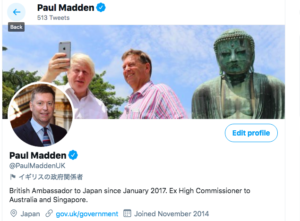22nd February 2021 Tokyo, Japan
Sankyu (thank you) Japan: a farewell twitter campaign
 As I prepared to leave Japan at the end of February, on completion of my assignment, I have been reflecting on my four years as Ambassador here, as well as the four years I spent here earlier in my career. I’ve been flicking through my photos.
As I prepared to leave Japan at the end of February, on completion of my assignment, I have been reflecting on my four years as Ambassador here, as well as the four years I spent here earlier in my career. I’ve been flicking through my photos.
I decided to do 39 tweets highlighting things I particularly love about Japan. Why 39? The numbers 3 and 9 are pronounced “san kyu” in Japanese, which sounds like “Thank You”.
In the tweets I’m featuring places, like the cultural treasure trove of Kyoto, and aspects of Japan’s extraordinary natural environment – lakes, mountains and the beautiful inland sea. But it’s also an opportunity to focus on other iconic Japanese things, like sushi, sake, kimonos, and izakaya (Japanese pubs). And I like to reference places with particular British links, like the Treaty Ports where we established our first consulates from the 1850s, and the Choshu and Satsuma students who travelled to study in the UK then returned to play key roles in the modernisation of Meiji Japan.
My tweets have attracted a much bigger reaction than I expected. My pinned tweet explaining the exercise gathered 67,000 likes and 800 direct replies. I’m maintaining a tally of which of the 39 gets the most likes – Castles is winning so far.
Japanese people seem to really like the fact that British diplomats make the effort to learn their language, travel their country widely, and try to understand their culture and history. Above all they seem delighted to know that a foreigner can come to love their country – which isn’t really hard to do. They readily offer tips on other places to visit, on their favourite foods and festivals, and on things they’ve enjoyed about the UK. The tweets also seem to have struck a chord in reflecting back to Japanese the many wonderful places in their country that have been hard for them to visit during the last year of COVID.
The exercise has attracted attention in the mainstream media too: it’s been covered in newspapers and featured by four TV networks. Way beyond what I expected when I began what I thought was a simple farewell. It’s a reminder that digital media can really help an ambassador communicate with ordinary people. And it’s been a great way to say “san kyu”